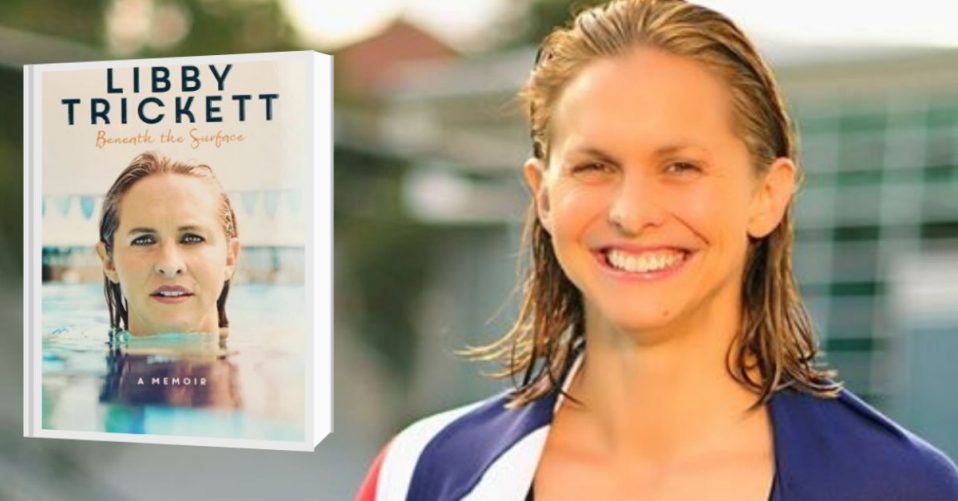By: Katrina Roe
She has won gold at 3 different Olympic Games in 2004, 2008 and 2012; she was the world record holder for the 100 metre freestyle; she is loved across the nation.
But beneath the surface, during all those years of great success, she was struggling—with crippling anxiety and depression.
Libby Trickett spoke about her new book, Beneath the Surface, in which she talks about her career highs and lows and opens up about her private struggle to overcome her mental health issues.
Although Libby is very used to talking about her swimming in the media, writing such a personal book was a daunting process.
“When you’re in the media as an athlete, you wear a form of armour, because you’re trying to achieve something,” Libby said. “When it comes to the idea of writing a book – one that is going to be warts and all, essentially – you open yourself up to be very vulnerable and judged and taken out of context… That was definitely very scary for me.”
Destined to Swim
Libby’s passion for swimming emerged early in life.
“I learnt to swim when I was one, I joined my first club when I was four, and I think from the moment that I did my very first club night race I absolutely fell in love with swimming and racing and competing. That was something that really resonated with me.”
But it wasn’t until Libby was 17, when she made it onto her first Australian youth team, that she realised she had the potential to turn it into her career. That realisation made her very excited.
“I’ve been privileged and lucky enough to win four Olympic gold medals, and they’re all so incredibly special in lots of different ways,” she said.
“Every four years you get this one tiny sliver of time to achieve your lifetime dream.”
“The best way that I can describe it is every four years you have – for me it was 56 seconds – to win an Olympic gold medal. So every four years you get this one tiny sliver of time to achieve your lifetime dream. And to touch the wall and turn around and see the number one next to your name is something that is quite hard to describe.
“The biggest emotion I felt at that time was relief, because you have such a short, minimal amount of time to achieve that. But I was incredibly proud and incredibly excited and I’m so grateful that I was able to put it together on that day.”
Facing Retirement
After the excitement of winning medals in Athens and Beijing, Trickett retired for the first time in 2009.
After a restless year off, she resumed her training, qualifying for her third Olympic Games in London in 2012. After London, Trickett’s goal was to make it to Rio in 2016. However, a persistent wrist injury gave her trouble. After a full wrist reconstruction that never completely healed, it became clear that her swimming career was over. Trickett retired for the second time in 2013 at the age of 27.
It was after her retirement that Trickett suffered from her first serious bout of depression, which she attributes to losing the support structure of training every day.
“You go from being one of the best in the world in your field, to being just like everyone else. It’s humbling and grounding… but also quite confronting. You are very average at what most people find easy.”
“When you go from doing 35 hours a week of training to nothing, that really messes with a lot of happy hormones – serotonin and endorphins and dopamine releases that you get through exercise,” she said. “So that’s quite confronting in and of itself. But I think one of the things I found most challenging was just scheduling my own time.
“When you’re an athlete, your time is kind of not your own. You’re scheduled. You know what you’re doing and when you’re doing it and you’re told how to do it and you do that to the best of your ability. And when you’re having to make those decisions yourself, it’s quite overwhelming and confronting.
“So you go from being one of the best in the world in your field, to being just like everyone else—which, you know, is a nice thing. It’s quite humbling and grounding in a lot of ways. But it’s also quite confronting for your ego, when you are very average at what most people find easy.”
When Trickett was offered a role on Dancing with the Stars, she jumped at the chance to throw herself into a project that would require intense physical training again.
The Emotional Challenge of Motherhood
But the challenge of Dancing with the Stars was nothing compared to her next project: having a baby. After the birth of her daughter Poppy, Trickett suffered from serious sleep deprivation, leading to severe post-natal depression.
“I was incredibly self-critical and harsh on myself because I was like, ‘Every woman around the world does this and somehow they’re all coping, and I’m not’… It was an incredibly sad time because I just couldn’t enjoy her.”
Libby says one of the main reasons she wrote the book was to let other women know they are not alone in their challenges.
“It’s okay to ask for help. You haven’t failed, you’re not weak. It’s really important to seek that assistance when you need it.”
“There are so many women around the world who struggle with that,” she said. “You’re not failing. You’re not a bad parent. You just have to ask the right people for help and that’s the most important thing during that time. And it’s okay to ask for help. You haven’t failed, you’re not weak. It’s really important to seek that assistance when you need it.”
“I think when you’re going through really difficult times it’s hard to see that it will be okay again. But through everything that I’ve gone through, and all of the experiences that I’ve had, as hard and as dark as it can get, you do become okay again. And ultimately whatever happens, it happens for a reason, and you can’t necessarily know or see why it’s happening that way, but it allows you to learn and grow and evolve into something even better than you were before.”
Article supplied with thanks to Hope Media.
About the Author: Katrina Roe is an award winning children’s picture book author, radio announcer and Mum of three passionate about child welfare, good health, books and the arts.




